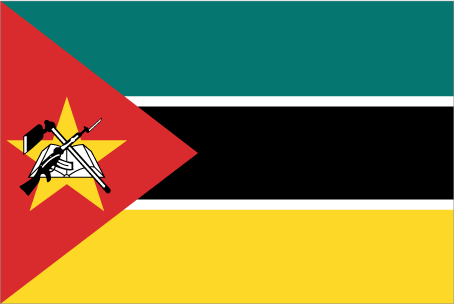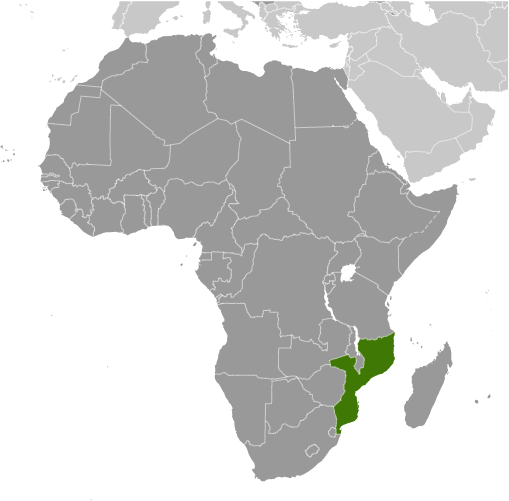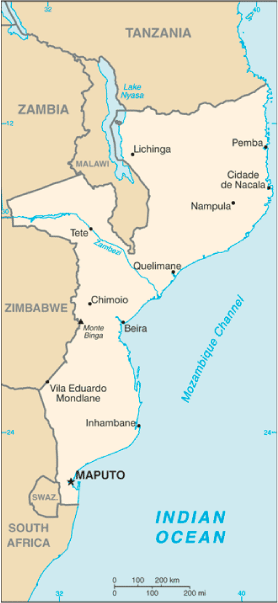Almost five centuries as a Portuguese colony came to a close with independence in 1975. Large-scale emigration, economic dependence on South Africa, a severe drought, and a prolonged civil war hindered the country's development until the mid 1990's. The ruling Front for the Liberation of Mozambique (FRELIMO) party formally abandoned Marxism in 1989, and a new constitution the following year provided for multiparty elections and a free market economy. A UN-negotiated peace agreement between FRELIMO and rebel Mozambique National Resistance (RENAMO) forces ended the fighting in 1992. In December 2004, Mozambique underwent a delicate transition as Joaquim CHISSANO stepped down after 18 years in office. His elected successor, Armando Emilio GUEBUZA, promised to continue the sound economic policies that have encouraged foreign investment.
Population
22,061,451
Country comparison to the world: 53
note:estimates for this country explicitly take into account the effects of excess mortality due to AIDS; this can result in lower life expectancy, higher infant mortality, higher death rates, lower population growth rates, and changes in the distribution of population by age and sex than would otherwise be expected; the 1997 Mozambican census reported a population of 16,099,246 (July 2010 est.)
Nationality
Noun:Mozambican(s)
Adjective:Mozambican
Ethnic groups
African 99.66% (Makhuwa, Tsonga, Lomwe, Sena, and others), Europeans 0.06%, Euro-Africans 0.2%, Indians 0.08%
Religions
Catholic 23.8%, Muslim 17.8%, Zionist Christian 17.5%, other 17.8%, none 23.1% (1997 census)
Languages
Emakhuwa 26.1%, Xichangana 11.3%, Portuguese 8.8% (official; spoken by 27% of population as a second language), Elomwe 7.6%, Cisena 6.8%, Echuwabo 5.8%, other Mozambican languages 32%, other foreign languages 0.3%, unspecified 1.3% (1997 census)
Country Name
Conventional long form:Republic of Mozambique
Conventional short form:Mozambique
Local long form: Republica de Mocambique
Local short form: Mocambique
Former:Portuguese East Africa
Government Type
republic
Capital
Name: Maputo
Geographic coordinates:25 57 S, 32 35 E
Time difference:UTC+2 (7 hours ahead of Washington, DC during Standard Time)
Administrative divisions
10 provinces (provincias, singular - provincia), 1 city (cidade)*; Cabo Delgado, Gaza, Inhambane, Manica, Maputo, Cidade de Maputo*, Nampula, Niassa, Sofala, Tete, Zambezia
Independence
25 June 1975 (from Portugal)
National Holiday
Independence Day, 25 June (1975)
Constitution
30 November 1990
Legal system
based on Portuguese civil law system and customary law; has not accepted compulsory ICJ jurisdiction
Suffrage
18 years of age; universal
Executive branch
Chief of state:President Armando GUEBUZA (since 2 February 2005)
Head of government:Prime Minister Aires Bonifacio ALI (since 16 January 2010)
Cabinet: Cabinet
(For more information visit the World Leaders website)
Elections:president elected by popular vote for a five-year term (eligible for a second term); election last held on 28 October 2009 (next to be held in 2014); prime minister appointed by the president
Election results:Armando GUEBUZA reelected president; percent of vote - Armando GUEBUZA 76.3%, Afonso DHLAKAMA 14.9%, Daviz SIMANGO 8.8%
Legislative branch
unicameral Assembly of the Republic or Assembleia da Republica (250 seats; members directly elected by popular vote to serve five-year terms)
Elections:last held on 28 October 2009 (next to be held in 2014)
Election results: percent of vote by party - FRELIMO 74.7%, RENAMO 17.7%, MDM 3.9%, other 3.7%; seats by party - FRELIMO 191, RENAMO 51, MDM 8
Judicial branch
Supreme Court (the court of final appeal; some of its professional judges are appointed by the president, and some are elected by the Assembly); other courts include an Administrative Court, Constitutional Court, customs courts, maritime courts, courts marshal, labor courts
Political Parties and Leaders
Democratic Movement of Mozambique (Movimento Democratico de Mocambique) or MDM [Daviz SIMANGO]; Front for the Liberation of Mozambique (Frente de Liberatacao de Mocambique) or FRELIMO [Armando Emilio GUEBUZA]; Mozambique National Resistance (Resistencia Nacional Mocambicana) or RENAMO [Afonso DHLAKAMA]
Political pressure groups and leaders
Mozambican League of Human Rights (Liga Mocambicana dos Direitos Humanos) or LDH [Alice MABOTE, president]
International organization participation
ACP, AfDB, AU, C, CPLP, FAO, G-77, IAEA, IBRD, ICAO, ICCt (signatory), ICRM, IDA, IDB, IFAD, IFC, IFRCS, IHO, ILO, IMF, IMO, IMSO, Interpol, IOC, IOM (observer), IPU, ISO (correspondent), ITSO, ITU, ITUC, MIGA, MONUC, NAM, OIC, OIF (observer), OPCW, SADC, UN, UNAMID, UNCTAD, UNESCO, UNHCR, UNIDO, Union Latina, UNWTO, UPU, WCO, WFTU, WHO, WIPO, WMO, WTO
Diplomatic representation in the US
Chief of mission:Ambassador Amelia Matos SUMBANA
Chancery: 1525 New Hampshire Avenue, Washington, DC 20036
Telephone:[1] (202) 293-7146
FAX:[1] (202) 835-0245
Diplomatic representation from the US
Chief of mission:Ambassador Leslie V. ROWE
Embassy: Avenida Kenneth Kuanda 193, Maputo
Mailing address:P. O. Box 783, Maputo
Telephone:[258] (21) 492797
FAX:[258] (21) 490114
Flag description
three equal horizontal bands of green (top), black, and yellow with a red isosceles triangle based on the hoist side; the black band is edged in white; centered in the triangle is a yellow five-pointed star bearing a crossed rifle and hoe in black superimposed on an open white book; green represents the riches of the land, white peace, black the African continent, yellow the country's minerals, and red the struggle for independence; the rifle symbolizes defense and vigilance, the hoe refers to the country's agriculture, the open book stresses the importance of education, and the star represents Marxism and internationalism










